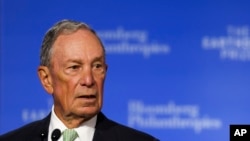Student Union
Tips for first-year international students in the US
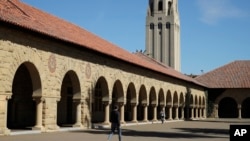
Book your flights right away, get a U.S. phone plan, make sure you have linens for your dorm and attend orientation – that’s some of the advice international students have for first-year college students coming from abroad.
U.S. News & World Report compiled helpful tips for students studying in the United States for the first time. (July 2024)
Survey: Social integration, career prep are important to international students
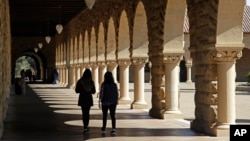
A recent survey of international students in the United States found that before starting school, they were concerned about personal safety, making friends and feeling homesick.
Inside Higher Ed reports that international students want specialized orientations, peer connections, career preparation and job placement to help make their college experiences successful. (July 2024)
US advisory council ends Nigeria visit, signs student exchange deal

Members of a U.S. presidential advisory council have approved a student exchange deal between an American college and a Nigerian university as part of the council's effort to strengthen collaboration on education, health, entrepreneurship and development between Africa and Africans living abroad.
The council also visited a health facility supported by the United States Agency for International Development in the capital.
Nigerian authorities and visitors chatted with members of the U.S President's Advisory Council on African Diaspora Engagement as they toured a healthcare facility in Karu, a suburb of Abuja, on the last day of the council's three-day visit to Abuja and Lagos.
The facility is one of many supported by the United States Agency for International Development, or USAID, to improve the management of childhood illnesses, family planning, immunization and delivery.
The tour was part of the council's effort to promote African diaspora-led investments in technology entrepreneurship, education and healthcare delivery.
"They're doing a phenomenal job there, it really gave us a sense of what the healthcare system is in Nigeria," said Deniece Laurent-Mantey, executive director of the advisory council. "This is our first trip as a council to the continent and we chose Nigeria for a reason — the diaspora in Nigeria is very active, very influential, and they're really a source of strength when it comes to our U.S.-Africa policy. And so for us coming to Nigeria was very intentional."
The council was created by President Joe Biden in September to improve collaboration between Africa and its diaspora in terms of economic and social development.
Akila Udoji, manager of the Primary Healthcare Centre of Karu, said officials in Nigeria were pleased that the council members were able to visit.
"We're happy that they have seen what the money they have given to us to work with has been used to do, because they have been able to assist us in capacity-building, trainings, equipment supply and the makeover of the facility," Udoji said.
Earlier, the council signed a deal for a student exchange program between Spelman College in the southern U.S. city of Atlanta and Nigeria's University of Lagos.
Laurent-Mantey said education exchanges are one of the council's top priorities.
"In Lagos, we had the president of Spelman College — she's also a member of our council — she signed an agreement with the University of Lagos to further education exchange programs in STEM and creative industries between those two universities," Laurent-Mantey said. "And I think for us it's very important, because Spelman College is a historically Black university, and so here we are promoting the importance of collaboration between African Americans and Africans."
In March, the advisory council adopted its first set of recommendations for the U.S. president, including the student exchange initiative, advocating for more U.S. government support for Africa, climate-focused initiatives, and improving U.S. visa access for Africans.
The council met with Nigerian health and foreign affairs officials during the visit before leaving the country on Wednesday.
American Academy of the Arts College announces closure

The American Academy of Art College in Chicago announced it would be closing after 101 years of preparing students for careers in art and illustration.
WTTW news reported that like other art colleges, the academy saw enrollment drop after the pandemic, and officials made the decision to close the college last month. (July 2024)
5 killed, dozens injured in clashes over Bangladesh jobs quota system

At least 5 people were killed and dozens injured in two separate incidents in Bangladesh as violence continued Tuesday on university campuses in the nation's capital and elsewhere over a government jobs quota system, local media reports said quoting officials.
At least three of the dead were students and one was a pedestrian, the media reports said. Another man who died in Dhaka remained unidentified.
The deaths were reported Tuesday after overnight violence at a public university near Bangladesh's capital, Dhaka. The violence involved members of a pro-government student body and other students, when police fired tear gas and charged the protesters with batons during the clashes, which spread at Jahangir Nagar University in Savar, outside Dhaka, according to students and authorities.
Protesters have been demanding an end to a quota reserved for family members of veterans who fought in Bangladesh's war of independence in 1971, which allows them to take up 30% of governmental jobs.
They argue that quota appointments are discriminatory and should be merit-based. Some said the current system benefits groups supporting Prime Minister Sheikh Hasina. Some Cabinet ministers criticized the protesters, saying they played on students' emotions.
The Bengali-language Prothom Alo daily newspaper reported that one person died in Dhaka and three others, including a pedestrian, were killed after they suffered injuries during violence in Chattogram, a southeastern district, on Tuesday.
Prothom Alo and other media reports also said that a 22-year-old protester died in the northern district of Rangpur.
Details of the casualties could not be confirmed immediately.
While job opportunities have expanded in Bangladesh's private sector, many find government jobs stable and lucrative. Each year, some 3,000 such jobs open up to nearly 400,000 graduates.
Hasina said Tuesday that war veterans — commonly known as "freedom fighters" — should receive the highest respect for their sacrifice in 1971 regardless of their current political ideologies.
"Abandoning the dream of their own life, leaving behind their families, parents and everything, they joined the war with whatever they had," she said during an event at her office in Dhaka.
Protesters gathered in front of the university's official residence of the vice chancellor early Tuesday when violence broke out. Demonstrators accused the Bangladesh Chhatra League, a student wing of Hasina's ruling Awami League party, of attacking their "peaceful protests." According to local media reports, police and the ruling party-backed student wing attacked the protesters.
But Abdullahil Kafi, a senior police official, told the country's leading English-language newspaper Daily Star that they fired tear gas and "blank rounds" as protesters attacked the police. He said up to 15 police officers were injured.
More than 50 people were treated at Enam Medical College Hospital near Jahangir Nagar University as the violence continued for hours, said Ali Bin Solaiman, a medical officer of the hospital. He said at least 30 of them suffered pellet wounds.
On Monday, violence also spread at Dhaka University, the country's leading public university, as clashes gripped the campus in the capital. More than 100 students were injured in the clashes, police said.
On Tuesday, protesters blocked railways and some highways across the country, and in Dhaka, they halted traffic in many areas as they vowed to continue demonstrating until the demands were met.
Local media said police forces were spread across the capital to safeguard the peace.
Swapon, a protester and student at Dhaka University who gave only his first name, said they want the "rational reformation of the quota scheme." He said that after studying for six years, if he can't find a job, "it will cause me and my family to suffer."
Protesters say they are apolitical, but leaders of the ruling parties accused the opposition of using the demonstrations for political gains.
A ruling party-backed student activist, who refused to give his name, told The Associated Press that the protesters with the help of "goons" of the opposition's Bangladesh Nationalist Party and Jamaat-e-Islami party vandalized their rooms at the student dormitories near the Curzon Hall of Dhaka University.
The family-of-the-veterans quota system was halted following a court order after mass student protests in 2018. But last month, Bangladesh's High Court nulled the decision to reinstate the system once more, angering scores of students and triggering protests.
Last week, the Supreme Court suspended the High Court's order for four weeks and the chief justice asked protesting students to return to their classes, saying the court would issue a decision in four weeks.
However, the protests have continued daily, halting traffic in Dhaka.
The quota system also reserves government jobs for women, disabled people and ethnic minority groups, but students have protested against only the veterans system.
Hasina maintained power in an election in January that was again boycotted by the country's main opposition party and its allies due to Hasina's refusal to step down and hand over power to a caretaker government to oversee the election.
Her party favors keeping the quota for the families of the 1971 war heroes after her Awami League party, under the leadership of her father, Sheikh Mujibur Rahman, led the independence war with the help of India. Rahman was assassinated along with most of his family members in a military coup in 1975.
Police open hazing investigation after Dartmouth student found dead

Police have opened a hazing investigation after a Dartmouth College student was found dead in a river in early July.
Police received a tip that hazing was involved, and there was evidence that alcohol might have been involved in the death, USA Today reported. (July 2024)
Americans' confidence in higher education falls, poll shows
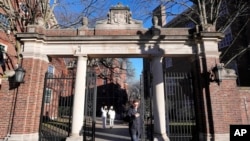
Confidence in higher education among Americans is declining, according to a recent poll that found 36% of adults expressed a "great deal" or "quite a lot" of confidence in higher education, down from 57% in 2015.
The Gallup and the Lumina Foundation poll also revealed that more than two-thirds (68%) of adults feel the U.S. higher education system is heading in the “wrong direction” vs. 31% of those respondents saying it is going in the “right direction.”
The poll, conducted June 3-23, surveyed 1,005 Americans aged 18 and older.
Declining enrollment mirrors concerns voiced by some Americans about colleges focusing on political agendas, neglecting relevant skills and being overly expensive.
Nathan Wyand, a software engineer in Charlottesville, Virginia, told VOA News he chose not to attend college due to high costs and the challenging curriculum.
“The mode of learning was very stressful. Every month and a half, I would break down in tears,” Wyand said, adding, “I didn’t want to deal with the debt and lack of freedom in choosing what to learn.”
Post-high school, Wyand said he explored different jobs before pursuing software development through a 10-month data science bootcamp at Flatiron School in New York.
“I took online courses at Flatiron, learning about software development. In my current role, I have practical experience, though less theoretical knowledge than peers with computer science degrees,” Wyand noted.
Wyand valued freedom in learning over being told what to learn in a structured classroom.
“I didn't want other people to tell me what I was going to learn, I was tired of that and ready to take charge of my education,” he said.
While costs influenced Wyand’s decision against college, he advises against dismissing it solely due to expenses.
“Don’t avoid college because you’re lazy or because it’s expensive. Avoid college if you feel that there is something better or more interesting to you that you can pursue instead. It’s important to have an objective,” he said.
The survey conducted last month reaffirms that 36% of adults maintain strong confidence in higher education, unchanged from the previous year.
“At a time where the U.S. needs more skilled Americans to fulfill our labor market needs of today and tomorrow it is concerning to see that they are losing confidence that higher education can deliver what they need,” Courtney Brown, vice president at Lumina, an education nonprofit, told VOA News.
Researchers are concerned by fewer Americans expressing “some” confidence and more reporting of “very little” or “none.”
“This year’s findings show a notable increase in those with little to no confidence, now at 32%, compared to 10% in 2015. This trend is alarming and must be reversed,” Brown said.
Brown stressed the need to address concerns about perceived political influences and lack of relevant skills in higher education.
“Society must tackle college costs directly. Many find college unaffordable, leading to crippling debt. I do believe higher ed can transform and ensure it meets the needs of students, but to do so we must pay attention to these data and address these concerns head on – the stakes of not doing so are far too great for individuals, communities and our nation,” Brown added.
John Pollock, a recent graduate of Columbia College Chicago, told VOA he agrees with the poll’s findings.
“College is a business, not a guarantee for jobs or debt repayment. Many our age see multiple paths to success,” Pollock said. He added that networking opportunities are one value that colleges offer.
Of the roughly one-third of Americans who expressed a “great deal/quite a lot” of confidence in higher education, 27% said it is important for individuals and society to be educated.
Of the roughly one-third of Americans who said their confidence in higher education was “very little/none,” 41% cited colleges as being “too liberal,” or trying to “indoctrinate” or “brainwash” students as reasons for their replies.
Overall, 68% of respondents believe higher education is on the wrong track, contrasting with 31% who see it heading in the right direction.
Some information for this report came from The Associated Press.
Report: US could have 2.8M international students in 10 years
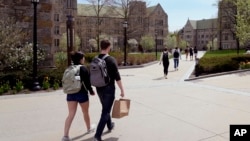
The United States, which currently has 1,057,188 students from 210 countries, could have 2.8 million students by 2034, according to a report in India’s Free Press Journal.
The report says India is likely to make a significant contribution to the increase, along with China, Vietnam, Nigeria and Bangladesh. (June 2024)
Small group of colleges educates 20% of undergrads
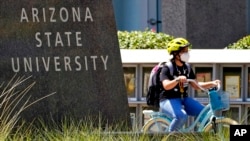
A group of just 102 public and private, four-year U.S. colleges and universities has an enrollment of 3.3 million students – about 1 in 5 of the nation’s undergraduates.
The Chronicle of Higher Education took a look at the institutions, their locations and their students. (June 2024)
After $1B gift, most Johns Hopkins medical students won't pay tuition

Most medical students at Johns Hopkins University will no longer pay tuition thanks to a $1 billion gift from Bloomberg Philanthropies announced Monday.
Starting in the fall, the donation will cover full tuition for medical students from families earning less than $300,000. Living expenses and fees will be covered for students from families who earn up to $175,000.
Bloomberg Philanthropies said that currently almost two-thirds of all students seeking a doctor of medicine degree from Johns Hopkins qualify for financial aid, and 45% of the current class will also receive living expenses. The school estimates that graduates' average total loans will decrease from $104,000 currently to $60,279 by 2029.
The gift will also increase financial aid for students at the university's schools of nursing, public health, and other graduate schools.
"By reducing the financial barriers to these essential fields, we can free more students to pursue careers they're passionate about – and enable them to serve more of the families and communities who need them the most," Michael Bloomberg, founder of Bloomberg Philanthropies and Bloomberg LP, said in a statement on Monday. Bloomberg received a bachelor's degree in electrical engineering from Johns Hopkins University in 1964.
The gift will go to John Hopkins' endowment and every penny will go directly to students, said Ron Daniels, president of Johns Hopkins University.
"Mike has really been moved by the challenges that the professions confronted during the course of the pandemic and the heroic efforts they've made to protecting and providing care to American citizens during the pandemic," Daniels said in an interview. "I think he simply wanted to recognize the importance of these fields and provide this support to ensure that the best and brightest could attend medical school and the school of nursing and public health."
Bloomberg Philanthropies previously gifted $1.8 billion to Johns Hopkins in 2018 to ensure that undergraduate students are accepted regardless of their family's income.
Johns Hopkins will be the latest medical school to offer free tuition to most or all of their medical students.
In February Ruth Gottesman, a former professor at the Albert Einstein College of Medicine and the widow of a Wall Street investor, announced that she was donating $1 billion to the school. The gift meant that four-year students immediately received free tuition and all other students will be offered free tuition in the fall.
In 2018, Kenneth and Elaine Langone gave $100 million to the NYU Grossman School of Medicine to make tuition free for all current and future medical students through an endowment fund. The couple gave a second gift of $200 million in 2023 to the NYU Grossman Long Island School of Medicine to guarantee free tuition for all medical students. Kenneth Langone is a co-founder of Home Depot.
Other medical schools, like UCLA's David Geffen School of Medicine, offer merit-based scholarships thanks to some $146 million in donations from the recording industry mogul, David Geffen. The Cleveland Clinic Lerner College of Medicine has also offered tuition-free education for medical students since 2008.
Candice Chen, associate professor, Milken Institute School of Public Health at The George Washington University, has researched the social missions of medical schools and had a strong reaction to the recent major gifts to John Hopkins, NYU and Albert Einstein.
"Collectively the medical schools right now, I hate to say this, but they're failing in terms of producing primary care, mental health specialists as well as the doctors who will work in and serve in rural and underserved communities," Chen said. She would have loved to see this gift go to Meharry Medical College in Tennessee, for example, which is a historically Black school that has produced many primary care doctors who work in communities that have shortages.
Bloomberg granted Meharry Medical College $34 million in 2020 as part of a $100 million gift he made to four Black medical schools to help reduce the debt of their medical students for four years.
There have been only a handful of previous $1 billion donations to universities in the U.S., most coming in the past several years.
In 2022, the venture capitalist John Doerr and his wife, Ann, gave $1.1 billion to Stanford University for a new school focusing on climate change.
The small liberal arts school McPherson College has received two matching pledges since 2022 from an anonymous donor totaling $1 billion. The school, which has around 800 enrolled students, has a program for automotive restoration and is located 57 miles north of Wichita, Kansas.
Bloomberg, the former New York mayor, gave $3 billion to charities in 2023, making him one of the largest donors, according to research by the Chronicle of Philanthropy.
Fewer job opportunities for computer science majors
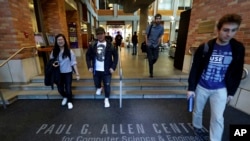
Recent computer science majors are finding entry-level jobs harder to come by, according to a report in The Wall Street Journal.
The newspaper found that tech companies are scaling back on hiring and turning more attention to artificial intelligence. (May 2024)
Bangladeshi protesters demand end to civil service job quotas

Thousands of Bangladeshi university students threw roadblocks across key highways Sunday, demanding the end of "discriminatory" quotas for coveted government jobs, including reserving posts for children of liberation heroes.
Students in almost all major universities took part, demanding a merit-based system for well-paid and massively over-subscribed civil service jobs.
"It's a do-or-die situation for us," protest coordinator Nahidul Islam told AFP, during marches at Dhaka University.
"Quotas are a discriminatory system," the 26-year-old added. "The system has to be reformed."
The current system reserves more than half of posts, totaling hundreds of thousands of government jobs.
That includes 30% reserved for children of those who fought to win Bangladeshi independence in 1971, 10% for women, and 10% percent set aside for specific districts.
Students said only those quotas supporting ethnic minorities and disabled people — 6% of jobs — should remain.
Critics say the system benefits children of pro-government groups, who back Prime Minister Sheikh Hasina.
Her father, Sheikh Mujibur Rahman, was Bangladesh's founding leader.
Hasina, 76, won her fourth consecutive general election in January, in a vote without genuine opposition parties, with a widespread boycott and a major crackdown against her political opponents.
Critics accuse Bangladeshi courts of rubber-stamping decisions made by her government.
The system was initially abolished after weeks of student protests in 2018.
But in June, Dhaka's High Court rolled that back, saying the cancellation had been invalid.
'Wasting their time'
Hasina has condemned the protests, saying the matter had been settled by the court.
"Students are wasting their time," Hasina told female activists from her party Sunday, Bangladeshi newspapers reported.
"After the court's verdict, there is no justification for the anti-quota movement."
Protests began earlier in July and have grown.
"We will bury the quota system," students chanted Sunday in Bangladesh’s second city Chittagong, where hundreds of protesters marched.
In Dhaka, hundreds of students disrupted traffic for hours, police said.
At the elite Jahangirnagar University, at least 500 students blocked the highway connecting the capital with southeastern Bangladesh "for two hours," local police chief A.F.M. Shahed told AFP.
Bin Yamin Molla, a protest leader, said at least 30,000 students participated in the protests, although the number could not be verified.
Bangladesh was one of the world's poorest countries when it gained independence in 1971, but it has grown an average of more than 6% each year since 2009.
Hasina has presided over that breakneck economic growth, with per capita income in the country of 170 million people overtaking India in 2021.
But much of that growth has been on the back of the mostly female factory workforce powering its garment export industry, and economists say there is an acute crisis of jobs for millions of university students.
International students navigate financial challenges to pay US tuition

Navigating the complexities of higher education is challenging for many, but for international students, the financial hurdles can be particularly daunting.
Faced with skyrocketing tuition and fees, limited access to financial aid, and the instability of scholarships, many international students struggle to sustain their academic dreams.
Funding problems can lead some students to withdraw their college applications, as Alpha Daramy Sesay of Sierra Leone did. He abandoned his dream of studying journalism at the University of Maryland.
"I've applied to almost three universities in the past two years, and the board members were thrilled with my purpose statement and approved my application unambiguously," Sesay told VOA News. "However, I was unable to register due to the funding bottleneck, and the deadline for these offers has just lapsed."
Sesay had meticulously planned his move to the U.S., even stopping his scholarship search when a family member promised financial support. When Sesay was admitted to his dream school, however, the family support fell through, leaving him scrambling for scholarships that didn't cover all expenses.
Reflecting on his ordeal, Sesay advises future international students to seek scholarships and consult with school advisers early to avoid similar setbacks.
Talia Popovski, senior director of International Student Services at Valencia College in Orlando, Florida, suggests starting at a community college to save on tuition costs.
"Primarily, we have international students pursuing associate degrees," she said. "This is a major way for them to save money compared to going directly to a university."
Popovski emphasized the benefits of community colleges as pathways to universities, with many international students pursuing associate degrees before transferring to earn their bachelor's degrees. She also highlighted the role of on-campus work in alleviating financial burdens, suggesting institutional work-study programs as options.
According to NAFSA: Association of International Educators, a nonprofit dedicated to international education and exchange, international students are ineligible for federal work-study positions, necessitating discussions with advisers about employment eligibility. Popovski also mentioned that universities offer part-time jobs through their human resources departments, including paid internships, which provide additional financial support for education.
Student secures honor scholarship
Guilherme Lucas Mannarino, who received his associate degree from Valencia College, turned down 32 esports scholarships to study in Florida.
"I came to the United States [from Brazil] when I was 18 years old," Mannarino recalled. "I rejected all the scholarships that I acquired through esports, playing Fortnite."
Mannarino, who majored in finance at Valencia College, exemplified proactive planning in overcoming financial challenges.
Despite declining the esports scholarships, Mannarino secured an honor scholarship at Valencia College covering 50% of his tuition. He attributed his financial stability to planning ahead, staying on top of his academics, and acquiring an on-campus job.
To supplement his income, he conducted workshops advising Brazilian students on esports scholarships, allowing him to cover living expenses by finding roommates through social media.
"I was able to find a roommate on social media before coming to the U.S., which is a great way to save money," he said. "A year later, we had another roommate, which made my living costs cheaper, which is honestly the best way to save money in the U.S."
Tips for overcoming financial hurdles
Kadiatou Sow, from Conakry, Guinea, is studying at Saginaw Valley State University in University Center, Michigan.
"Managing the high cost of tuition and living expenses while studying abroad involves a strategic approach," Sow said. "I prioritize securing scholarships and grants tailored for international students to alleviate tuition expenses and sometimes cover living costs. Supplementing this with part-time work both on campus and in the local community provides a steady income for daily necessities."
She encourages fellow international students to balance work and studies effectively, understand visa work-hour regulations, and seek university support for financial aid options.
"Seeking guidance from university support services and staying informed about financial aid options are essential strategies for navigating these challenges successfully," Sow said.
Three ways international students can overcome financial hurdles:
1. Community college enrollment: Begin with an associate degree at a community college to save significantly on tuition costs before transferring to a university for a bachelor's degree.
2. On-campus employment: Explore institutional work-study programs and university job boards for part-time employment opportunities that complement studies and provide financial support.
3. Proactive financial planning: Save money before arriving in the U.S., seek scholarships tailored for international students, and explore paid internship opportunities to supplement income.
While financial obstacles are daunting, international students can achieve their academic aspirations through strategic planning, diligent scholarship pursuit and leveraging on-campus resources, advisers say.
By adopting proactive financial strategies and staying resilient, they can successfully navigate the challenges of financing their education abroad, ensuring a path to academic success and personal growth.
- By VOA News
Indian newspaper offers tips for US-bound students

Telangana Today, a newspaper in India, offers a list of tips and resources for students planning to study in the United States.
Among them:
- Prepare for your travel to the U.S., making sure to gather all necessary documents, including your passport and visa.
- Be sure to attend orientations.
- By VOA News
Michigan State international students get their own space

Michigan State University in East Lansing, Michigan, is setting aside a space in the International Center for international students.
Nidal Dajani, vice president of the school's International Student Association, said that the club plans to use the space to host events and hopes to collaborate with other student groups.





